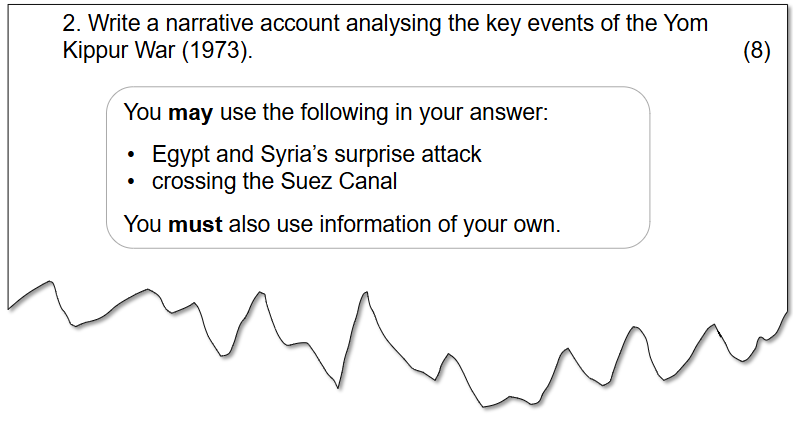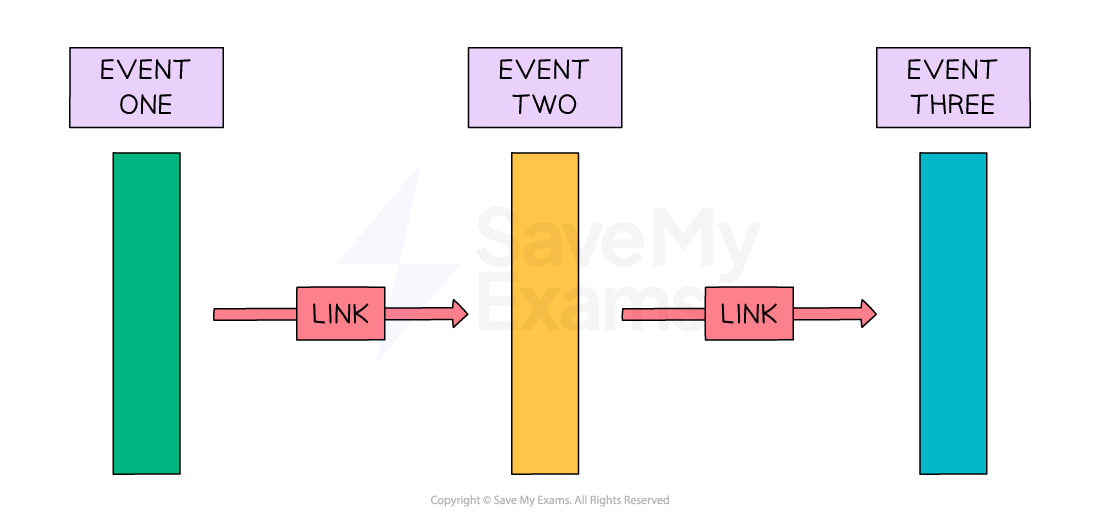The 8 Mark "Write a Narrative Account" Question (Edexcel GCSE History): Revision Note
Exam code: 1HI0
Summary of Question 2
Question 2 requires you to write an analytical narrative
This means explaining a sequence of key events and how they are linked together
You must write about each stage of the narrative in chronological order
Amount of marks | 8 |
|---|---|
The time that you should spend on the question | No more than 15 minutes |
An example of the type of question you may encounter can be seen below:

In previous years, this question has focused on the following topics for Conflict in the Middle East:
Year of exam | Question topic |
|---|---|
2018 | Egypt’s relations with Israel, 1973–77 (opens in a new tab) |
2019 | The Suez crisis in 1956 (opens in a new tab) |
2020 | The Palestinian issue, 1970–72 (opens in a new tab) |
2021 | No paper available |
2022 | The negotiations between Israel and the Palestinians, 1993–95 (opens in a new tab) |
2023 | The developments in Israel, 1949–54 (opens in a new tab) |
2024 | Relations between Israel and Egypt, 1949–56 |
The importance of chronology
Chronology is the ability to place events in time order
In the narrative account, you must write about three events in the correct order
If you write the events out of order, you will only get 2 marks
Do not include events outside the time frame of the question
To help, the exam provides you with two stimulus points
The stimulus points are sometimes given with dates
If not, the stimulus points are arranged in time order
If you do not know the stimulus points, you are allowed to use your own knowledge
If you only use the two stimulus points, you can only achieve a maximum of four marks
Sequencing and linkage in GCSE History
Sequencing
Sequencing in history is the order in which events happened
For the example question, the crossing of the Suez Canal happened before the UN ceasefire
A sequence of events could:
Happen over a short or long period of time
Stretch over multiple events
Have negative and positive impacts
When explaining sequencing, you need to be careful not to write a story
Linkage
A linkage in history refers to the connections between events or issues
For the example question, US reinforcement connects the crossing of the Suez Canal to the UN ceasefire
Linkage allows historians to:
Compare historical events
Explain the causes and consequences of an event
Explain the wider developments of a period
Use connective phrases like:
"As a result … "
"Consequently … "
"This led to … "
"Because of this … "
Planning your answer will make it easier to make linkages

How to answer a "Write a narrative account" question
Your answer should include:
An organisation of three events into chronological order
Specific and relevant knowledge of each event in the narrative account
An explanation of how each event connects to the next
Before you write the question, ensure that you have the following:
Good knowledge of the three events that you are using in the narrative account
A clear understanding of how each event links together
This will allow you to achieve the analytical narrative that the examiner is looking for
To create successful linkages for Conflict in the Middle East, you should consider if the event:
Heightened or lessened tensions in the Middle East
Improved or worsened relations between Middle Eastern countries
Helped or hindered the creation of key states like Israel
Improved or worsened international attitudes towards the Middle East
"Write a narrative account" question structure
Your answers could be written using CHRONOLINK
CHRONO — Put the sequence of events in chronological order
LINK — Connect each section of the narrative to the next event that occurred
To achieve full marks, you should aim to write about three events in the narrative account
These events can be organised into one paragraph per event or one continuous paragraph
The question is out of 8 marks
4 marks for knowledge (K)
4 marks for your analysis of the second-order concepts of causes, consequences and/or changes (SOC)
Worked example of a "Write a narrative account" question
Worked Example
Write a narrative account analysing the key events of the Yom Kippur War (1973).
(8)
You may use the following in your answer:
You must also use information of your own. |
Answer:
The Yom Kippur War began on 6th October 1973, when Egypt and Syria launched a surprise attack on Israel on Yom Kippur, the holiest day in the Jewish calendar (K). The timing meant many Israeli soldiers were on leave, giving Egypt and Syria a temporary advantage. This surprise attack was significant because it shocked the Israeli public and military, temporarily weakening Israel’s sense of security. As a consequence, the early Arab success created high tension in the Middle East, raising fears of Israeli collapse (SOC).
This high tension led to the Israeli counterattack beginning on 8th October. Israeli forces, reinforced with US military support, pushed back Syrian forces and crossed the Suez Canal into Egyptian territory (K). This turnaround was significant because it showed Israel’s military strength and dependence on US support. This further angered Arab nations and worsened tensions between Israel and the Arab world (SOC).
Due to this escalated tension, the West stepped in to end the conflict with a UN ceasefire on 25th October 1973 (K). Although neither side could claim a decisive victory, Egypt took pride in its efforts. This caused a shift in regional politics as Egypt gained confidence to enter peace talks. This led to future diplomacy such as the Camp David Accords (1978) (SOC).

Unlock more, it's free!
Was this revision note helpful?